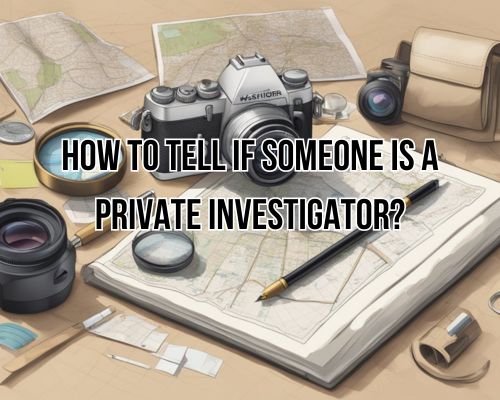If you suspect that someone is a private investigator, it’s essential to know how to identify them.
Private investigators are often hired to conduct surveillance or gather information on individuals. Their job requires them to remain discreet and blend in with their surroundings. However, there are some telltale signs that can help you determine if someone is a private investigator.

One way to spot a private investigator is to look for their behavior.
Private investigators are trained to be observant and detail-oriented, so they may appear to be constantly surveying their surroundings. They may also be seen taking notes or using binoculars to observe people from a distance.
Additionally, private investigators may use tactics such as following someone on foot or in a vehicle to gather information. So, if you notice someone following you, it’s possible they could be a private investigator.
Another way to identify a private investigator is to look for specific equipment or accessories.
Private investigators often use cameras, recording devices, and other surveillance equipment to gather information. They may also carry a badge or identification card that identifies them as a private investigator. If you notice someone carrying any of these items, it’s possible they could be a private investigator.
Identifying a Private Investigator
If you suspect that you are being followed or under surveillance, it is possible that a private investigator is tracking your movements. Here are some behavioral indicators, surveillance tactics, and professional equipment use that can help you identify a private investigator.
Behavioral Indicators
Private investigators like Private Investigator West Palm Beach, are trained to blend in with their surroundings and remain unnoticed. However, there are some behavioral indicators that you can look out for to identify a private investigator. These may include:
- Repeatedly seeing the same person in different locations
- Someone constantly staring or making eye contact with you
- Someone who appears to be loitering or waiting for you
- Someone who asks a lot of questions about your personal life or daily routine
- Someone who attempts to engage you in conversation or gain your trust
Surveillance Tactics
Private investigators use a variety of surveillance tactics to gather information about their target. These may include:
- Following you on foot or in a vehicle
- Using hidden cameras or recording devices to capture your activities
- Monitoring your phone or internet activity
- Conducting background checks on you or your associates
Professional Equipment Use
Private investigators use a range of professional equipment to gather information and conduct surveillance. Some of the equipment they may use include:
- Cameras: Hidden cameras, long-range lenses, and night vision cameras
- GPS trackers: Used to track the location of a vehicle or person
- Listening devices: Used to capture conversations
- Binoculars: Used to observe from a distance
- Drones: Used for aerial surveillance
Legal and Ethical Considerations
When it comes to private investigators, there are certain legal and ethical considerations that you need to be aware of. In this section, we’ll discuss some of the most important factors that you should keep in mind.
Understanding Privacy Laws
Privacy laws are an important consideration when it comes to private investigators.
In general, investigators must follow strict guidelines when it comes to collecting information about individuals. This includes obtaining consent before conducting surveillance or gathering personal information.
It’s important to note that privacy laws can vary depending on the jurisdiction. For example, in Australia, private investigators must comply with the Privacy Act 1988. This act outlines the rules around collecting, using, and disclosing personal information.
Licensing and Regulations
Private investigators are typically required to be licensed and regulated by the government.
This helps to ensure that they are operating within legal boundaries and following ethical standards.
In Australia, private investigators are regulated by the Security Industry Act 1997. This act outlines the requirements for obtaining a license, as well as the rules around conducting investigations.
Working Within Legal Boundaries
Private investigators must always work within legal boundaries. This means that they cannot engage in activities that are illegal or unethical.
For example, they cannot trespass on private property, use illegal surveillance techniques, or provide legal advice.
It’s important to choose a reputable and licensed private investigator like Private Investigator West Palm Beach, to ensure that they are working within legal boundaries and following ethical standards.
If you have any concerns about the legality of a private investigator’s activities, you should seek legal advice.
Overall, understanding the legal and ethical considerations around private investigators is crucial when it comes to protecting your privacy and rights.
By choosing a licensed and reputable investigator, you can ensure that your investigation is conducted within legal boundaries and in a way that respects your privacy.
